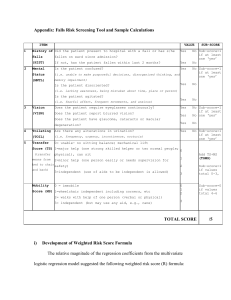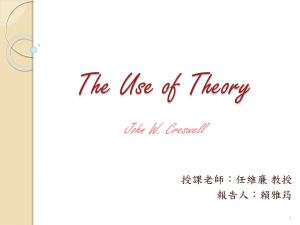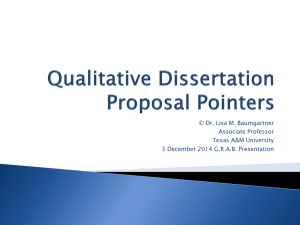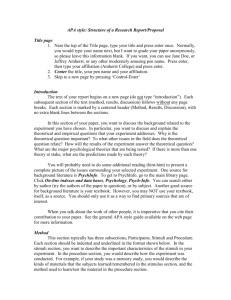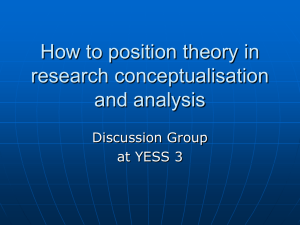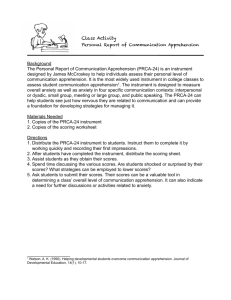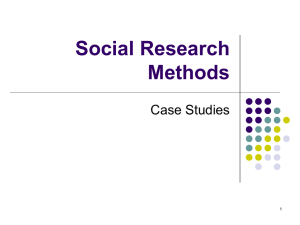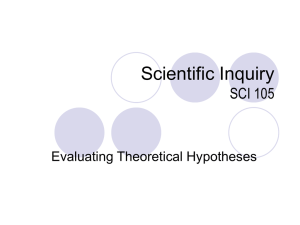Conceptualization
advertisement
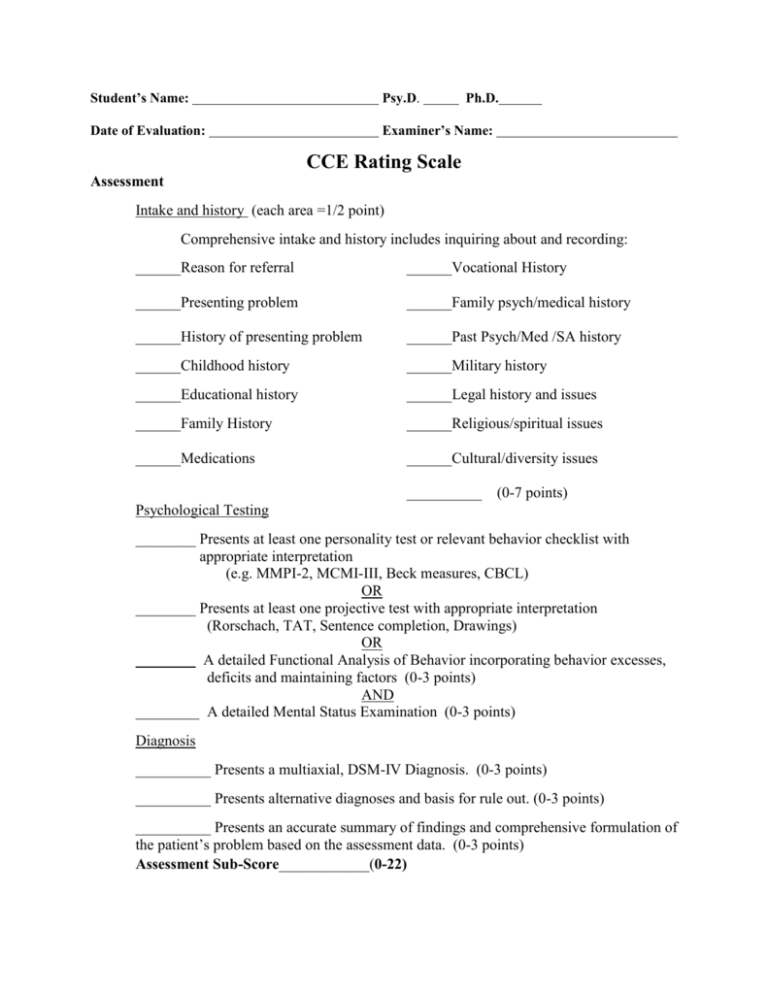
Student’s Name: Psy.D. Date of Evaluation: Examiner’s Name: Ph.D. CCE Rating Scale Assessment Intake and history (each area =1/2 point) Comprehensive intake and history includes inquiring about and recording: ______Reason for referral ______Vocational History ______Presenting problem ______Family psych/medical history ______History of presenting problem ______Past Psych/Med /SA history ______Childhood history ______Military history ______Educational history ______Legal history and issues ______Family History ______Religious/spiritual issues ______Medications ______Cultural/diversity issues __________ (0-7 points) Psychological Testing ________ Presents at least one personality test or relevant behavior checklist with appropriate interpretation (e.g. MMPI-2, MCMI-III, Beck measures, CBCL) OR ________ Presents at least one projective test with appropriate interpretation (Rorschach, TAT, Sentence completion, Drawings) OR A detailed Functional Analysis of Behavior incorporating behavior excesses, deficits and maintaining factors (0-3 points) AND A detailed Mental Status Examination (0-3 points) Diagnosis __________ Presents a multiaxial, DSM-IV Diagnosis. (0-3 points) __________ Presents alternative diagnoses and basis for rule out. (0-3 points) __________ Presents an accurate summary of findings and comprehensive formulation of the patient’s problem based on the assessment data. (0-3 points) Assessment Sub-Score____________(0-22) 2 Conceptualization Theoretical Model(s) ___ 3. Is able to articulate a professionally accepted theoretical approach and/or a set of empirically validated procedures or systematically integrate two or more such approaches with evidence of significant depth of understanding of these approaches. (4-5 points) _____2. Is able to describe a theoretical approach or integration of two or more such approaches with adequate depth of understanding of the theories. (1-3 points) _____1. Presents a theoretical approach reflecting little depth of understanding and/or integrates two or more such approaches inappropriately or in a way that violates the assumptions of those theories. (0 points) Relevance ______3. The approach is based on a careful consideration of client and therapist goals and a thorough assessment of all of the most clinically relevant issues that are presented (i.e. suicidal behavior, history of sexual abuse, substance abuse, severe psychopathology). (4-5 points) ______2. The approach reflects basic or superficial goals and an assessment that addresses the most obvious issues, while ignoring more subtle issues or those that would have required a more careful evaluation. (1-3 points) ______1. The approach ignores the client’s most important goals and needs and fails to address the most clinically relevant issues, while focusing on superficial problems. (0 points) Integration ______3. The conceptualization incorporates the client’s unique history, current problems and personality style and applies the theoretical model and/or the empirically validated approach to the actual data of the client’s life in a highly individualized manner. (4-5 points) ______2. The formulation incorporates some important data of the client’s life but fails to account for much of the relevant history or life situation, appealing to theoretical assumptions from the model without adequate empirical support. (1-3 points) ______1. The conceptualization relies mostly on theoretical constructs and offers little in the way of integration of relevant historical, mental status or personality variables that are empirical. (0 points) 3 Flexibility of Approach _______3. Is able to articulate one alternative, appropriate and distinct theoretical approach or other empirically validated procedure(s) of their choosing to the case with a sound depth of understanding and appropriateness to the client’s situation. (4-5 points) ______2. Is able to describe an alternative approach with adequate understanding of the basic principles and some degree of applicability to the case. (1-3 points) ______1. Is unable to articulate an alternative model and/or provides no applicability to the actual case. (0 points) Legal/Ethical Issues 3. Carefully considers legal implications of case, including reporting requirements while maintaining respect for client confidentiality and commitment to high professional standards. (4-5 points) ______2. Adequately protects client confidentiality but ignores more subtle issues pertaining to the professional relationship (i.e. boundary issues) or fails to consider possible legal complications. (1-3 points) ______1. Fails to address important legal responsibilities in the case or to protect client confidentiality. (0 points) Diversity 3. Demonstrates a good understanding of how cultural or other diversity issues influence the case while taking them into account in both the assessment and treatment of the client. (4-5 points) ______2. Acknowledges the role of culture and diversity in the case, but addresses those dimensions superficially in the treatment of the client. (1-3 points) ______1. Ignores the role of diversity and culture in the case. (0 points) Limitations/Indications ______3. Is able to clearly describe the indications and limitations of the intervention model chosen for the case as well as the alternate model that the student has chosen. (4-5 points) ______2. Has some understanding of the indications and limitations of the model, but unaware of many contraindications or has no insight into the limitations/indications of the alternate model. (1-3 points) ______1. Is unable to adequately discuss the limitations or indications of both their intervention model and the alternate model. (0 points) 4 Outcome/Self-Critique ______3. Clearly describes and documents client outcome and understands and is able to selfcritique and explain the basis for success or failure of the intervention as well as his/her therapeutic errors or oversights. (4-5 points) ______2. Is able to describe client outcome, but is limited in the ability to self-critique and explain the basis for success or failure of the intervention. (1-3 points) ______1. Cannot clearly describe or document client outcome and is unable to self-critique and explain the basis for the success or failure of the intervention. (0 points) Conceptualization Sub-Score____________ (0-40) Clinical Skills/Intervention Listening ______3. Listens effectively to client, responds to their verbalizations without introducing new questions, unless clinically indicated, and demonstrates that they are following client’s train of thought with few interruptions or digressions. (4-5 points) ______2. Follows client’s train of thought, typically responds to some last or preceding comment without introducing new data, unless clinically indicated, but has tendency to talk too much or direct the discussion too often or inappropriately. (1-3 points) ______1. Fails to listen to client, does not follow client’s lead or train of thought and directs the interview with little regard for client’s initiative. (0 points) Understanding/Empathy _______3. Uses reflection of feeling and content and accurately communicates an understanding of client feelings, attitudes and concerns. (4-5 points) _______2. Uses reflection of either feeling or content and is able to communicate an adequate level of understanding, but often misses the client’s major concerns. (1-3 points) _______1. Does not utilize effective empathy skills and is unable to communicate adequately their understanding of the client’s expressed concerns. (0 points) 5 Questioning ________3. Uses open-ended questions as appropriate that facilitate the client’s exploration of problems and concerns. (4-5 points) ________2. Is able to use open-ended questions appropriately, but falls back frequently upon closed ended questioning that limits client exploration. (1-3 points) ________1. Questioning tends to be inappropriately closed-ended and rarely facilitates adequate exploration or explanation of the client’s difficulties. (0 points) Other facilitating techniques ________3. As appropriate, uses clarification, confrontation, feedback, summary statements and silences in exploring client issues. (4-5 points) ________2. Is able to employ clarification, summary statements, feedback and silences when appropriate, but does so ineffectively or too infrequently to enhance client exploration of problems. (1-3 points) ________1. Even when appropriate, rarely if ever uses clarification, feedback, silences or summary statements to enhance exploration of client issues. (0 points) Fidelity of Intervention _________3. The taped session reflects many interventions that accurately reflect the proposed conceptual/theoretical/empirical framework offered by the student. (5-8 points) _________2. The taped session has some evidence of clinical interventions that are consistent with the student’s conceptualization, but the interventions are often unrelated or inconsistent with the model proposed. (1-4 points) _________1. The taped session reflects little or no correspondence with the student’s treatment model. (0 points) Clinical Skills/Intervention Sub-Score____________ (0-28) 6 Quality of Written Document ______3. The written document is clearly and concisely written, comprehensive in covering the relevant dimensions of the case and is free of any errors in grammar and spelling. (6-10 points) ______2. The document is sufficiently comprehensive, but may lack clarity at times or occasional errors in spelling and grammar. (1-5 points) ______1. The written document is poorly written, omits important information and/or has many errors in spelling and grammar. (0 points) Quality of Written Document Sub-Score_________ (0-10) Assessment Sub-Score____________(0-22) Conceptualization Sub-Score____________ (0-40) Clinical Skills/Intervention Sub-Score____________ (0-28) Quality of Written Document Sub-Score_________ (0-10) Total CCE Score___________(0-100) Overall Evaluation: Pass Remediate Signature: Date: PLEASE RETURN THIS FORM WITHIN 10 DAYS TO THE CLINICAL TRAINING OFFICE
